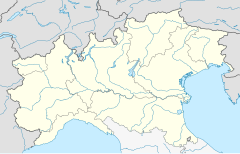Chiavari railway station
|
Chiavari
|
|
|---|---|

The passenger building.
|
|
| Location | Corso Angelo Gianelli 16043 Chiavari GE Chiavari, Genoa, Liguria Italy |
| Coordinates | 44°18′54″N 09°19′21″E / 44.31500°N 9.32250°ECoordinates: 44°18′54″N 09°19′21″E / 44.31500°N 9.32250°E |
| Operated by |
Rete Ferroviaria Italiana Centostazioni |
| Line(s) | Pisa–La Spezia–Genoa |
| Distance | 37.654 km (23.397 mi) from Genova Piazza Principe |
| Train operators | Trenitalia |
| Connections |
|
| Other information | |
| Classification | Silver |
| History | |
| Opened | 23 November 1868 |
| Location | |
Chiavari railway station (Italian: Stazione di Chiavari) serves the town and comune of Chiavari, in the Liguria region, northwestern Italy. Opened in 1868, it forms part of the Pisa–La Spezia–Genoa railway, and is situated between La Spezia and Genoa.
The station is currently managed by Rete Ferroviaria Italiana (RFI). However, the commercial area of the passenger building is managed by Centostazioni. Train services to and from the station are operated by Trenitalia. Each of these companies is a subsidiary of Ferrovie dello Stato (FS), Italy's state-owned rail company.
The station is located in a passageway between the town centre and the promenade.
Originally, there was a railway bridge linking Piazza Nostra dell'Orto (north of the station) and Piazza Vittorio Leonardi (to the south). In the early seventies, this bridge was demolished and the pedestrian underpass, which connects only the first track, was extended in both directions. Since then, the underpass has been used as a link between the two parts of the city.
The passenger building is a masonry structure on two levels, of which only the ground floor is open to the public. The architecture of the building is original and hard to find at Italian railway stations: it is composed of two buildings joined together by a gallery in which there are many amenities for travelers.
The station once had a goods yard with an adjoining goods shed. However, the goods yard has since been dismantled and replaced by a parking lot for FS employees, and the warehouse has been converted to storage. The architecture of the former warehouse is very similar to that of other Italian railway stations.
...
Wikipedia

